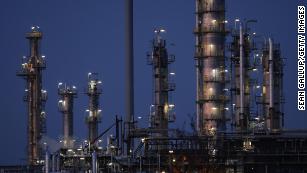BP took a hit of more than $24 billion from ditching its business in Russia but reported a huge jump in profit for the first quarter.
According to CNN, the UK-based energy giant said Tuesday that its underlying profit soared to $6.2 billion from $2.6 billion in the same period last year, boosted by “exceptional oil and gas trading” conditions.
Oil prices have shot up by nearly 40% since the start of 2022, with benchmark Brent crude trading well above $100 a barrel. Prices for natural gas have also surged. The gains have been driven by fears of a global supply shock following Russia’s invasion of Ukraine.
Prime Minister Boris Johnson’s government has so far resisted those calls, saying it wants companies to invest more in securing supplies of energy, particularly from renewable sources but also oil and gas. But his finance minister, Rishi Sunak, last week hinted at a possible U-turn in government policy.
“What I don’t want to do is put off the investment that’s required to exploit those resources,” Sunak said in an interview with Mumsnet, a website for parents. “But what I would say is that if we don’t see that type of investment coming forward and if the companies are not going to make those investments in our country and in our energy security, of course that’s something I would look at. Nothing is ever off the table in these things.”
BP said it expected to pay up to £1 billion ($1.2 billion) in tax on profits this year from its operations in the North Sea, and is planning to invest £18 billion ($22.5 billion) in the United Kingdom by 2030. That will include investments in the North Sea, offshore wind, electric vehicle charging networks, hydrogen production and carbon capture and storage.
In response to the war, the United States, Canada, United Kingdom and Australia have banned imports of Russian oil, and the European Union could soon join them. EU countries are dramatically scaling back purchases of Russian natural gas, and Moscow has already cut off supplies to Poland and Bulgaria.
On Feb. 27, three days after President Vladimir Putin sent his forces across the border into Ukraine, BP (BP) said it would ditch its stake of nearly 20% in Russian state oil giant Rosneft, and abandon three joint ventures with the country’s biggest oil producer. On Tuesday, it said those decisions led to an after-tax charge of $24.4 billion, and a loss of $20.4 billion.
“In a quarter dominated by the tragic events in Ukraine and volatility in energy markets, BP’s focus has been on supplying the reliable energy our customers need,” CEO Bernard Looney said in a statement. “But it has not changed our strategy, our financial frame, or our expectations for shareholder distributions,” he added.
Shareholders are in line for a windfall. BP announced a first quarter dividend of 5.46 cents per share, up from 5.25 cents last year, and said it would use spend $2.5 billion — or 60% of its surplus cashflow — buying back shares in the next three months.
Shares of BP were up 2.5% in London trading, taking the stock’s gain for the year so far to nearly 22%.
Opposition lawmakers said the bumper earnings reinforced their call for the UK government to impose a one-off windfall tax on excess profits generated by companies producing oil and gas in the North Sea.
They want the proceeds to help fund additional relief for households who are paying sky high prices for fuel and heating in the worst cost-of-living crisis in decades.
“With so many people struggling to pay their energy bills, we should have a windfall tax on oil and gas companies in the North Sea, who have made more profit than they were expecting,” Keir Starmer, leader of the opposition Labour Party told the BBC. “Have a windfall tax on that and use that to help people with their energy bills, up to £600 for those who need it most.”
